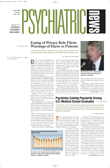We read with interest the article titled “Residents Must Be Taught to Teach, Training Directors Say” in the December 7 issue.
It is very encouraging to see an increasing emphasis on cultivating and sharpening the teaching skills of the doctors. We must begin with the very word “doctor” and examine our professional identity. Etymologically, the word “doctor” in Latin means “teacher” and is derived from “docere,” meaning “to teach.” Thus, a doctor is primarily a teacher. Healer, resident, consultant, attending, professor, and so on are all various other layers of identity that ought not to eclipse a doctor’s basic identity, that is, a teacher.
This perspective shall coax and coerce us to rediscover an identity that gets lost in oblivion due to numerous factors that merit critical examination. Perhaps the most threatening factor is the bottom line—money. Is teaching as monetarily rewarding as patient care or medical research? Why should one develop and devote his or her career as a teacher? True, the gratification in teaching is both subjective and substantive, but that does not pay the bills, a bitter reality. Further, development of and devotion to a teaching career are not even valued by medical schools, as tenure is accorded on the basis of excellence in the area of research rather than teaching. A school is a school due to teachers, a fact more evidently seen in all schools but medical schools; medical schools have a moral responsibility to protect, preserve, and promote teaching with respect. It is encouraging to see that some pioneer schools have begun to lead in financially protecting teaching time in an attempt to, among other goals, reverse the decline in student enrollment and faculty retention.
While the article focused on residents, the development of teaching skills must begin from the start of medical education since the formative period of medical education is first about actualization of the basic identity as a teacher. If the emphasis on this is laid later, a critical time for grooming has lapsed, underscoring a need for a proactive educational approach.
We should like to share two other thoughts. The word “teaching” is generally used in the context of medical students and residents. However, teaching our patients is just as important an obligation and expectation. In many ways, this is an even more neglected area of education than is medical education. We as doctors are not educated enough to be as competent and effective as educators (teachers) as our patients expect us to be. Simplifying technical jargon and effectively communicating to our patients are cornerstones of our therapeutic alliance and a duty. Finally, teaching is not just about being a successful professional; role modeling is first about the successful person without the white coat.
